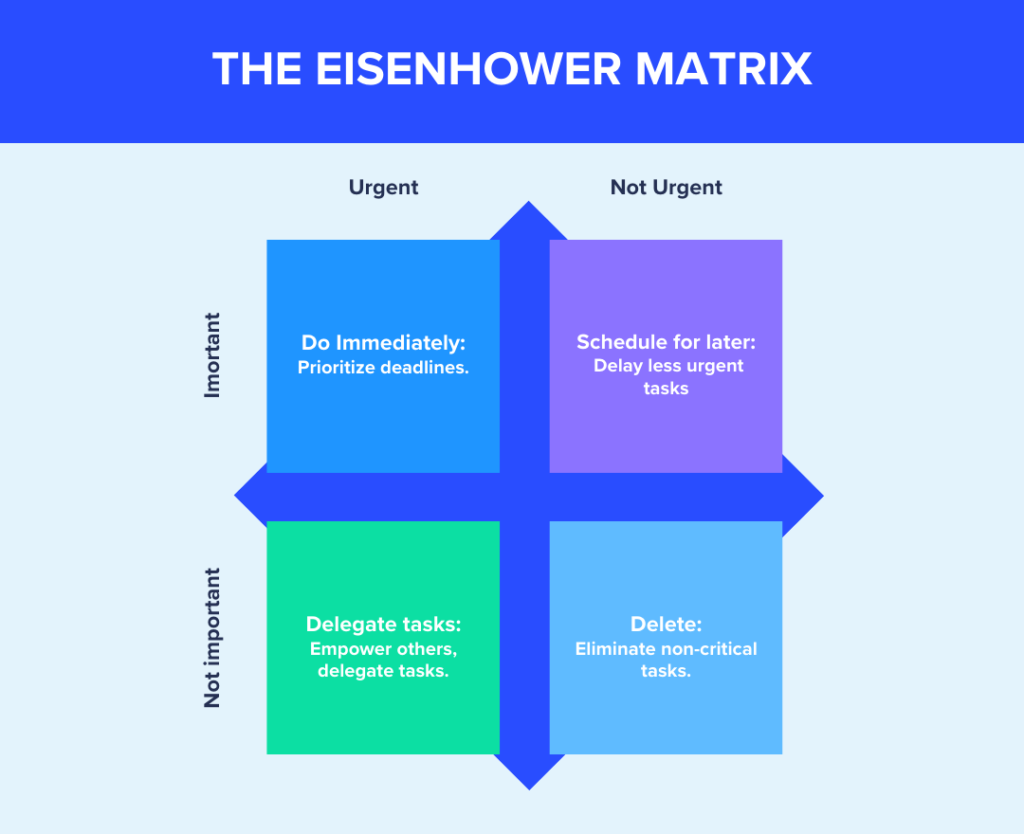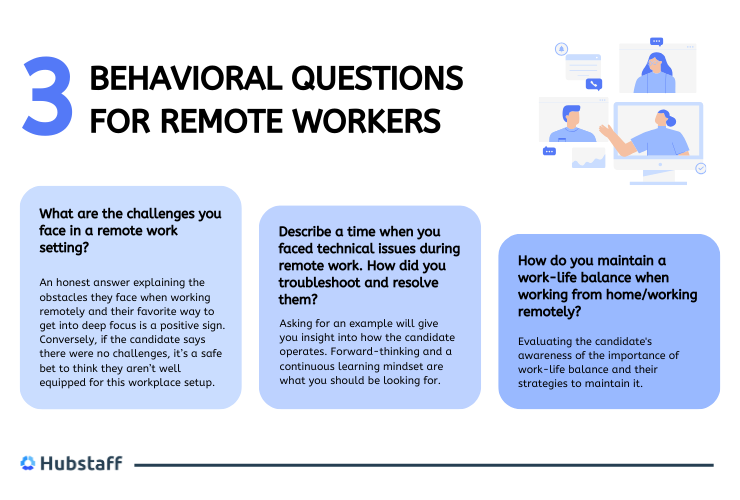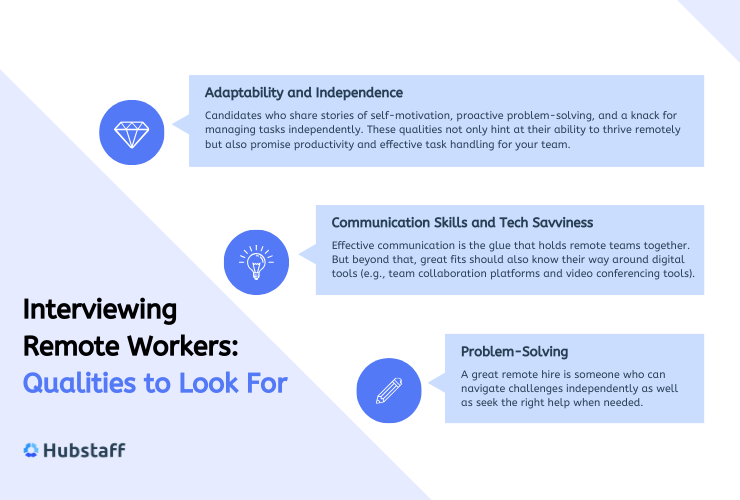You just wrapped up your resume screening, you’ve got lots of good candidates, and now you really starting to feel like you’re one step closer to filling a remote position. But now it’s time to get into the nitty-gritty and prep some interview questions for remote workers.
You’ve done dozens of interviews already, so the questions basically pour out of you—but then you get stuck. This is your first time interviewing people for a remote job. What questions should you keep, and what should you change?
With 40% of U.S. employees now working remotely at least one day a week (a five-fold increase from 2019 to 2023), it’s evident that the traditional office setup is undergoing a profound shift. As the realms of work evolve, so must our approach to recruitment.
Remote work requires a different set of skills, a unique mindset, and the ability to thrive independently. Posing the right questions, thus, becomes the linchpin of successful remote hiring. Fortunately, this guide is here to help.
Boost your team’s efficiency with Hubstaff's productivity tools
Try it free for 14 daysEssential Interview Questions for Remote Workers
The exact contents of your interview questions for remote workers will be highly specific to each role you’re hiring for. But broadly speaking, your list should cover questions that let you know both your candidate’s skills and their compatibility with remote work dynamics.
If you are looking for something applicable to most of your remote positions, try the following:
General Questions for Remote Work Suitability
Working on a distributed team invites unique demands that extend beyond one’s job-related skills. Here are the top 6 questions that can help you detect whether a candidate is suitable for a remote workplace.
Question: Could you please share your experience with remote work?
A classic question in any remote job interview! A candidate with impressive experience delivering good work in remote work dynamics is a huge plus. But it’s essential to understand that experience doesn’t always make for a good fit. Some might have worked remotely for years and hated it, while others may be first-timers but have what it takes to excel in this working arrangement.
Example of a good answer:
“Absolutely! I’ve worked remotely for two and a half years as a project manager at [insert company name]. There was one project I got the opportunity to manage that involved coordinating with people across three different time zones in France, India, and the U.S. Thanks to this experience, I got familiar with lots of helpful tools. For instance, we used Zoom for team meetings, Asana for project management, Loom for asynchronous communication, and Hubstaff for productivity tracking to make sure everyone stayed on the same page. This experience also taught me a lot about how to work independently and as a team in a distributed team setting. It also and helped me understand a lot more about different cultures and mindsets.”
Question: How do you ensure effective communication with other remote team members?
Communication is the oxygen of remote work — and you want someone who breathes it effortlessly. Those who have remote work experience but struggle to clearly articulate communication strategies or lack examples of successful remote communication may not be the best fit for a remote setting.
On the other hand, a good remote worker will know how to bridge communication gaps and proactively seek solutions to overcome them. They are the ones who:
- Conduct regular check-ins with their team
- Have an understanding of different communication preferences across the team
- Identify and use communication channels that work for each employee
For those who haven’t worked remotely before, you’ll want to ask about their communication style and how they prefer handling potential communication issues. This can help you determine if this person will be the right fit for your distributed team.
Example of a good answer:
“I used to work as a COO at [startup name] for two years. We were an entirely remote team whose team members were from 6 different timezones, so maintaining a clear and effective communication method was truly challenging.
After observing the team for a few weeks, I decided to set up informal 1:1s with each team member every two weeks. I also recorded all weekly Zoom calls and made them optional so team members who could not attend the meetings could still access them later on. For daily conversations, we utilized Slack channels. For task management, we used Asana. While these weren’t huge changes, we got positive feedback from the team on how they helped them work more easily and feel more connected with other members.”

Question: How do you make sure effective team collaboration in a remote environment?
Distributed teams often span various time zones, so a great remote team member should show their capability in teamwork with others from different cultures and how they make use of technology to bridge the time zone gaps.
Example of a good answer:
“Thanks to the time I worked as a tech lead at my former software company, I’ve learned how to navigate time zone differences and made it a second nature to me. I was in California while my developers were in Vietnam, and my designers were in Australia. The time zone differences were huge, so setting up regular calls was not a sound option for us.
In order to make sure we still collaborated effectively, I held rotating meetings for our weekly team calls to accommodate everyone’s working hours while using Slack for daily communications among colleagues. We also made good use of Trello to assign and manage projects. And when training was required, I’d record a Loom and send it to all related team members so they can access it when they’re online. By being clear about what communication channel was used for what purpose, we managed to work effectively despite working in different locations.”
Question: What motivates you to work remotely, and how do you stay engaged and committed to your tasks?
Staying motivated with little to no external supervision is fundamental to thriving in remote work. Candidates with a strong sense of responsibility and autonomy will likely be more resilient and dedicated. Conversely, it’ll only be a matter of time before those attracted solely by the convenience of remote work get bored and give up on this work setup.
Example of a good answer:
“My motivation for remote working stems from the flexibility and autonomy it provides. I find that I’m most productive and creative when I have the freedom to structure my work environment. I set daily goals at the start of each day and also set up a dedicated workspace to limit distractions. Regular breaks between deep work sessions and a mix of collaborative and independent tasks also help me stay focused while not exhausting myself.”
Question: Could you please share how you manage your tasks as a remote worker?
Another critical characteristic of an ideal remote worker is their ability to prioritize and manage their tasks by themselves. Additionally, a follow-up like “Can you share a situation where you had multiple deadlines? How did you handle it, and what was the outcome?” may lend an easy flow to the conversation and help you gain more insights into how they handle pressure at work.
Example of a good answer:
“Of course! When working independently, I make it a point to begin my day by making a to-do list to categorize my tasks based on urgency and importance. My go-to strategy is utilizing the Eisenhower Matrix to distinguish between what’s urgent and what’s important. For instance, when surrounded by multiple deadlines, I often rely on this method instead of my gut to finalize my priorities. I’m at my best when focusing on one task at a time, so I try not to do multiple things simultaneously. I also make sure to spare time for some non-urgent yet important tasks in between to maintain efficiency. This strategy helps me a lot with managing work under pressure.”

Question: What tools do you use to stay engaged and organized in a remote team?
It’s hard, if not impossible, to perform any remote task today without the support of technology. You want someone who can get along fast and well with your current AND future gadgets. After all, our relationship with technology is always evolving, and a good fit should embrace that change.
Example of a good answer:
“I use collaboration tools like Slack and Asana to communicate and collaborate with my colleagues on a daily basis. Platforms like Zoom and Microsoft Teams are my go-to for team meetings and 1:1s. I also think staying openminded about new tech is as important as making good use of the current tools.”
Role-Specific Remote Work Questions
If you’re having trouble coming up with role-specific work-from-home questions, here are a few ones we have prepared for three popular remote jobs: customer service, IT support, and project management.
Remote Customer Service Job Interview Questions and Sample Answers
Here are a few tailored questions and insights for your interviews with remote customer service and virtual assistant candidates.
Question: How do you maintain a positive and customer-centric attitude while working remotely in customer service?
A great remote CSM understands that positive customer interactions matter and can provide concrete evidence of how they will successfully manage your remote customer relations.
Example of a good answer: “I have always prioritized active listening and tried to put myself in the customer’s shoes to fully understand their concerns from their perspective before offering any solutions. I’ve also learned that customers hate being kept in the dark. They will be highly appreciative if you inform them promptly of the next steps and be honest with them about the expected time to resolve their request.
So, throughout my time working as a remote CSM, I’ve tried to understand and empathize deeply with customers’ frustration. As I determined what problem they were facing, I’d make sure I’d proactively reach out and keep them posted on our progress along the way — good or bad”
Question: What is your approach to handling a high volume of customer inquiries as a remote CSM?
This question assesses the candidate’s organizational and time management skills in a remote context. A strong remote worker will demonstrate experience in providing quick and satisfying support.
Example of a good answer:
“My first and foremost step in this case has always been organizing all the inquiries based on urgency and complexity. What I found when working as a remote CSM at my former employer was that many times, customers’ questions are similar or one in the same. So, for these common questions, I established canned responses I could easily refer to deliver helpful support with efficiency.
For unique and more complex problems, I’ve tried to work on them with my colleagues while checking in with the customers regularly and, if necessary, offered a short-term solution before we delivered the ultimate one. This approach has helped me maintain prompt and satisfactory responses even in high-pressure situations.”
Question: How do you ensure consistent and accurate customer information delivery?
This question digs into the candidate’s remote approach to maintaining these standards. A good fit for your remote CSM will stress the importance of accurate responses and share examples of keeping info consistent in a remote setup.
Example of a good answer: “I rely on a deep understanding of our company’s products, services, and company guidelines. Specifically, pre-built, official resources like product updates and knowledge bases are my go-to sources for getting quick, accurate information. I’ve always visited these resources almost daily to make sure I get the latest information. Still, I find it important to take a moment to cross-verify everything for consistency before responding to a customer inquiry. In case the questions cannot be solved with available resources, after seeking support from the right colleagues, I’ve always made sure all information I gained from the exchange (including offered solutions) was recorded and confirmed in our internal system for future references.”
Remote Job Interview Questions for IT Support Roles with Answers
Here are some key questions and what to look for in responses when interviewing IT support professionals for your remote job.
Question: How do you troubleshoot technical issues remotely, and what tools do you find most effective in your process?
When you pop this question, you’re diving into their technical know-how. A strong answer should emphasize how they use remote support tools like remote desktop software, ticketing systems, or collaboration platforms to troubleshoot technical issues remotely.
Example of a good answer:
“My go-to approach is clearly understanding the problem’s scope. First, I’d ask the customer targeted questions to identify whether it’s a hardware or software issue. Then, I usually use diagnostic tools to find out the root cause systematically. Remote desktop software, like TeamViewer or AnyDesk, helps me access users’ systems to see the issues in general firsthand.
To look deeper into the issues, I’d check the history of reported issues in our ticketing systems. If I need further insights from the customers, I’d email them or ask them for another TeamViewer, depending on specific cases. All these communications with customers are recorded so I can easily go back to them when needed. I’ve applied this method for over three years across my remote CSM roles at different companies, and it has consistently improved my troubleshooting skills and made customers happy.”
Question: Can you share an experience where you remotely resolved a complex technical issue, and what steps did you take to ensure the problem was fully addressed?
This question is an example of what interviews can do that resumes can’t—seeing for yourself how a candidate solves a real-world problem. A strong response should include how they diagnosed, troubleshooted, and went the extra mile to prevent future hiccups. If a candidate can explain these to a non-techy person (like a manager or a client), that’s a big win.
Example of a good answer:
“Certainly! I’d love to share with you my experience working as an online customer support at software startup ABC. There was a situation where an HR user encountered a strange software glitch affecting critical operations. Defining this was not a common and simple issue. After reading the user’s description, with the customer’s permission, I remotely accessed their system using TeamViewer to go through all possible causes and finally found that the real culprit behind the glitch was a compatibility issue with recent updates. I managed to fix the immediate problem within an hour and also provided a live detailed explanation to the user in layperson’s terms. To prevent something similar from happening in the future, I took the time to implement a scheduled software update plan and conducted a brief virtual training session for the team to keep everyone informed.”
Question: How do you stay updated on the latest technologies and trends in the IT support domain while working remotely?
Top-tier IT support professionals won’t just rely on what they knew yesterday. A strong candidate will show they’re driving their own learning bus and maybe mention specific certifications, courses, or communities they engage with to stay informed.
Example of a good answer: “I do believe staying current in IT is truly important nowadays to any IT professional, whether they are just new graduates or have a decade of experience working in this industry.
My favorite source to keep me updated on new IT trends is online forums. I go to Spiceworks’ almost every morning before I start my work. Other than that, I find virtual conferences like Cisco Live and publications like InformationWeek pretty helpful to learn about emerging technologies and trends. I also set aside time each quarter to finish one new course from online learning platforms like SkillShare and Grow With Google. CompTIA A+ is one of the certifications I’ve just pursued recently.”
Role-Specific Remote Work Questions for Project Managers
If you’re bringing in remote project managers, consider these work-from-home interview questions and answers:
Question: Can you share an experience where you successfully led a remote team through a project’s completion?
This question is gold for getting a feel of their real-world leadership. Look for candidates who dive into specifics—milestones achieved, challenges faced, and how they kept the remote team motivated.
A grade-A candidate should talk about how they adapted project management methods. Bonus points if they throw in using tools your team is using. The goal is to find someone who not only leads but knows how to do it seamlessly from a distance.
Example of a good answer: “Certainly! One notable project I’ve managed lately involved coordinating a team of seventeen team members from five different time zones to launch a new software product in 3 months. Given the tight deadline and the complexity of the project, I onboarded the team in Asana to keep track of each team member’s tasks. I also utilized this platform to set up a recognition system to reward those who achieved each milestone.
In addition to regular check-ins in Slack to keep everyone in sync, I hosted a weekly call that is optional to join for anyone so those with questions or concerns could easily seek help. As a result, we managed to launch our new product a few days sooner without encountering any major work conflicts.”
Question: How do you manage and track the progress of remote team members to ensure project timelines are met?
You want project managers who ace remote work dynamics—they promote accountability without going full-on micromanager. Top candidates will lay out a systematic approach to track progress, tweak timelines as needed, and make sure each remote team member has the support they need.
Example of a good answer: “In managing team members working remotely, I prioritize transparent communication and accountability without micromanaging. I have used Jira and Asana for task allocation and deadlines. Making your colleagues feel heard is really important, too. I usually hold weekly check-ins, but rather than making them stressful, I try to keep them engaging to ensure everyone is not only on track but also staying motivated.
I’m a firm believer in a proactive stance. Timelines will be adjusted if need be. And if the adjustments make it more challenging for the team members, I’ll make sure they are well equipped with extra support (usually in the form of outsourcing or temp work) and that their hard work is well rewarded.”
Behavioral Questions for Remote Workers
Just as in in-person or face-to-face interviews, not including scenario-based questions is a missed opportunity to better understand a candidate’s decision-making and problem-solving abilities. Below are a few examples of behavioral questions to ask your potential remote workers and some advice on how to look into candidates’ answers.
Question: Describe a time when you faced technical issues or obstacles when working remotely in the past. How did you troubleshoot and resolve them?
Technical challenges are inevitable in remote work, so you’ll need a remote employee capable of maintaining productivity and minimizing disruptions as issues occur.
Asking for an example will provide you insight into how the candidate operates.
- Do they take the initiative to address issues independently, or do they wait for guidance?
- Do they anticipate potential challenges?
- How realistic are their expectations? ]
Forward-thinking and a continuous learning mindset are what you should be looking for. After all, these are traits of a high-performing remote worker.
Question: How do you maintain a work-life balance when working from home?
Employee mental health is at an alarming state. You may already know from your own experience that burnout poisons employee satisfaction and productivity.
Clear boundaries and defined working hours are some telltale signs of a potential remote worker who understands the importance of a work-life balance.
Question: What are the challenges you face when working remotely?
Navigating the emotional aspects when teammates and supervisors are six time zones away takes work. Not to mention, working in a remote environment means your workers are surrounded by multiple distractions—kids playing around, pets constantly climbing on the desk requesting a break time, and friends paying surprise visits.
An honest response that outlines the obstacles they’ve faced and their preferred methods for deep focus is a positive signal. On the flip side, candidates downplaying challenges might not be well equipped for this working setup.

Fun and Engaging Questions for Remote Employees
A remote job interview needs a healthy mix of both technical and light-hearted questions. After all, creating a positive work environment starts with getting to know your prospective hires on a more personal level. Here are some fun questions to ask remote candidates:
Question: Share a funny or interesting story from your experience working remotely.
Encourage candidates to share a chuckle or a head-scratcher from their time working remotely. Not only will the candidate benefit from the positive and friendly tone this question sets for the interview, but you’ll also gain valuable insights into their personality and how they navigate the challenges of remote work.
Question: If your pet could describe your work style, what do you think they would say?
Adding a bit of humor into the interview, this playful question gives candidates an opportunity to bring their creativity as well as personality to the interview.
Question: If you were to organize a team-building activity for your distributed team, what would it be?
Remote work shouldn’t mean we skip on team fun. This question taps into a candidate’s team-oriented mindset and creativity. From virtual escape rooms to online trivia nights, this question allows candidates to showcase their innovative ideas for bringing teams together despite the physical distance. And who knows? You might uncover some fantastic ideas for team bonding.
Light-hearted, culture-fit questions to understand the candidate’s personality
Here are the top three light-hearted interview questions we’ve found valuable for making interviews more enjoyable. They’re also great in helping unveil the personality behind the resume.
Question: What’s the most interesting or unusual skill you possess outside of work?
We all have unique talents beyond what’s on our resumes. This question taps into that hidden treasure of personal skills. Whether it’s performing magic tricks, playing a musical instrument, or mastering the art of origami, these talents can tell you a lot about someone’s personality. More than just a conversation starter, it’s a way to see how their quirks might align with your company culture.
Question: If you could have a remote office anywhere in the world, where would it be and why?
Remote work comes with the perk of flexibility, and this question gives insights into the candidate’s personal preferences and sense of adventure. From camping in the forest to a beachside retreat, their ideal remote office could offer insights into their creativity and how they envision an optimal work environment. Plus, it’s a glimpse into what brings them joy and could be a great rewards idea.
Question: What’s your favorite remote work snack, and why does it fuel your productivity?
In the midst of a busy day, everyone’s got that snack buddy. This light-hearted question not only brings a touch of humor but also provides a casual window into their daily routine.
Whether it’s a chocolate bar or the crunch of carrot sticks, their snack choice can be a sweet moment of connection and a window into their work habits. And again, it might spark ideas for your recognition and rewards program.
Analyzing Candidate Answers
When evaluating interview responses from remote candidates, make sure you have your radar tuned to these essential qualities:
Adaptability and Independence
Remote work demands individuals who can handle challenges independently. According to SHRM, adaptability is one of the four essential soft skills for successful remote work. Great remote employees are those who share stories of self-motivation, proactive problem-solving, and a knack for managing tasks independently.
Communication Skills and Tech Savviness
Imagine a remote team where communication is a mess—definitely not a pleasant picture. Good communication is the glue that holds distributed team members together. But beyond that, great fits should also know their way around digital tools. After all, they’ll find themselves working with team collaboration platforms and video conferencing tools literally every single day if hired.
Problem-Solving
Candidates with strong problem-solving skills can handle surprises and be a positive force in your team. A great remote hire is someone who can navigate challenges independently as well as seek the right help when needed.

Remote Work Interview Resources
Having the right resources can help a lot in learning and optimizing your remote interviews. Here are a few gems you’ll want to check out:
- Harvard Business Review is known for its well-researched articles and expert advice on various business topics — and many of them are remote work strategies and effective hiring practices.
- SHRM is a reputable source for H.R. professionals whose articles cover multiple topics related to remote work, including recruitment and workforce management.
- LinkedIn Talent Blog covers not just remote hiring but industry trends, best practices, and case studies related to talent acquisition.
- Hubstaff Blog offers lots of good content that is hyper focused on remote work, including hiring and managing distributed teams.
- Remote.co Blog specializes in remote work and provides resources for both employers and remote job seekers.
- Glassdoor Blog covers employer branding and hiring tips, which can be valuable for remote recruitment.
Downloadable Interview Questions PDF
For a handy and accessible format of these insightful remote work interview questions, we’ve got you covered! Click here to download the Interview Questions PDF.
Conclusion
Ultimately, a successful remote candidate should not only possess the skills and qualifications required for the role but should also showcase characteristics that align with the unique demands and dynamics of remote work. The remote job interview questions above are designed to help you uncover the qualities crucial for success in a remote setting.
For more tips on nurturing and leading remote teams, check out the Hubstaff blog. Happy interviewing!
Most popular
How to Calculate a Raise: Practical Guide for Employers
By 2030, the US alone will lose $430 billion annually due to low talent retention — and a lot of this turnover stems from low pa...
How to Survive and Thrive in an 80-Hour Work Week
It’s hard to believe that only a century ago, the 80-hour work week was the norm in the United States. Then, in 1926, the Ford M...
Mastering Workforce Scheduling: Techniques and Tools for Success
Imagine a workday where scheduling your workforce effectively ensures that every shift is perfectly aligned with your business nee...
Top Time Trackers for Virtual Assistants: Enhance Efficiency and Accountability
Virtual assistants (VAs) have a lot of responsibilities — and so do the people who hire them. With so much to keep track of, a t...




